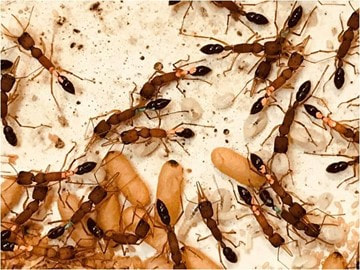[Seminar Blog] Caste-switching jumping ants: studies on the plasticity of reproduction and lifespan5/3/2023
By Megan Ma Dr. Francisco Carmona-Aldana (he/him), a postdoctoral scholar at the New York University School of Medicine, recently presented his research on “Ants: studies on the plasticity of reproduction and lifespan” which focuses on how ants obtain tradeoffs between reproduction and longevity through caste-switching. In the collaborative projects led by Dr. Danny Reinberg and Dr. Claude Desplan, he and his team study ants of the species Harpegnathos saltator as an experimental model to understand how aging can be regulated. H. saltator ants are peculiar in that workers can become pseudo-queens and take reproductive control of their colonies when a queen is absent. A group of 4 to 6 ants will undergo antennal dueling, a behavioral interaction to determine who will become pseudo-queens, or “gamergates.” These gamergates will have active ovaries, lay eggs, and extend their lifespans to accommodate this reproductive caste-switching. They live for 3 years in comparison to their lifespan as a former worker (1 year) and the maximum lifespan found in queens (5 years). In addition to altering the duration of their lifespans, gamergates have the potential to revert back to their worker states (induced in laboratory conditions). They can return to their original, non-reproductive role to perform their worker duties and no longer produce eggs. To induce this reversion in the lab, gamergates are first put in social isolation, then re-introduced into a mature colony that contains their own, well-established gamergates. These revertants continue their lives as workers, but not without physical evidence of caste-switching. Dr. Carmona-Aldana and his peers found confirmation of caste switching in the revertant’s brain, fat body, and ovaries. The revertant ovaries return to an underdeveloped state (like workers). Although they show remnants of old egg production, the gene expression pattern in the brain and the fat body show no difference from that of workers. The Insulin gene homolog was found to be highly expressed during the transition from worker to gamergate, leading to one of the questions being: “What might the presence of Insulin be doing during caste switching?” Dr. Carmona-Aldana, along with fellow researchers Hua Yan and Comzit Opachaloemphan, decided to see what would happen if they injected workers with insulin. They found the addition of insulin is sufficient to activate reproduction. When they compared lifespan, they confirmed an increase in the gamergate compared to the worker. In gamergate to revertant transitions, they showed that the survival decreases to levels comparable to workers that did not undergo caste switching. Through RNAseq and ex vivo incubation of tissues, they showed that the Imp-L2 gene is highly expressed in the gamergate, and the protein inhibits the AKT signaling pathway downstream of Insulin activation. They propose this inhibition allows lifespan extension, while Insulin activity through the MAPK pathway allows active reproduction.
This pattern of increased lifespan and fecundity is what sets this system apart from what is typically observed in other insects¹. Dr. Carmona-Aldana and his lab will explore multiple avenues to identify why this pattern is unique to eusocial insects. The next steps of this research will be to investigate differential biases in plasticity, physiological memory of previous states, and molecular markers of plasticity. Findings from this unique system have implications for understanding the physiological processes that contribute to aging, which is of particular interest to the field of human medicine. Following his research presentation, Dr. Carmona-Aldana spoke about his personal experience as a researcher and his path in this specific field of science. He shared that he was the first member of his family to obtain a graduate degree. He advised graduate students to above all else, be patient and that research can be technically difficult and often scary, but simultaneously, an exciting and challenging career choice. To keep up with Dr. Carmona-Aldana’s research, please visit his LinkedIn page. ¹Yan, H.; Opachaloemphan, C.; Carmona-Aldana, F.; Mancini, G.; Mlejnek, J.; Descostes, N.; Reinberg, D. Insulin signaling in the long-lived reproductive caste of ants. Science 2022, 377, 1092–1099. Megan Ma (they/them) is a first-year Ph.D. student in the Shultz and Wood lab studying the evolution and functional morphology of spider chelicerae. Comments are closed.
|
Categories
All
Archives
June 2024
|
Department of Entomology
University of Maryland
4112 Plant Sciences Building
College Park, MD 20742-4454
USA
Telephone: 301.405.3911
Fax: 301.314.9290
University of Maryland
4112 Plant Sciences Building
College Park, MD 20742-4454
USA
Telephone: 301.405.3911
Fax: 301.314.9290



 RSS Feed
RSS Feed




